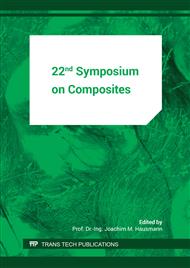p.487
p.493
p.500
p.509
p.515
p.521
p.527
p.535
p.541
RecyCarb: Process Optimization and On-Line Monitoring in the Recycling of Carbon Fibre Waste for the Re-Use in High-Grade Fibre Reinforced Plastics
Abstract:
Within the project ‘RecyCarb’ a qualified value-added chain for recycled carbon fibres (rCF) to enable their high-quality and sustainable re-use in sophisticated fibre-reinforced composites was established. A team of four industrial partners and two research institutes closed the technological gap between the actual rCF available on the market and the functional re-use as reinforcing elements in high-quality components. Process optimisation, initiation of a reliable scheme of quality assurance and a process integrated quality monitoring were the main aspects of this project. Besides different kinds of carbon fibre waste, different nonwoven processes (web formation and bonding methods) and an online fibre orientation analysis were investigated. This project focuses a variety of several application markets, e.g. sports equipment, medical technologies or automotive, shown by developed demonstrators.
Info:
Periodical:
Pages:
515-520
DOI:
Citation:
Online since:
June 2019
Authors:
Keywords:
Price:
Сopyright:
© 2019 Trans Tech Publications Ltd. All Rights Reserved
Share:
Citation:


